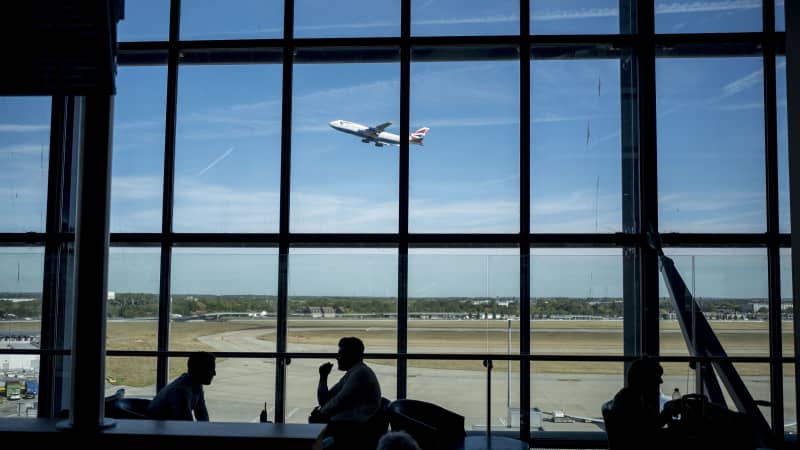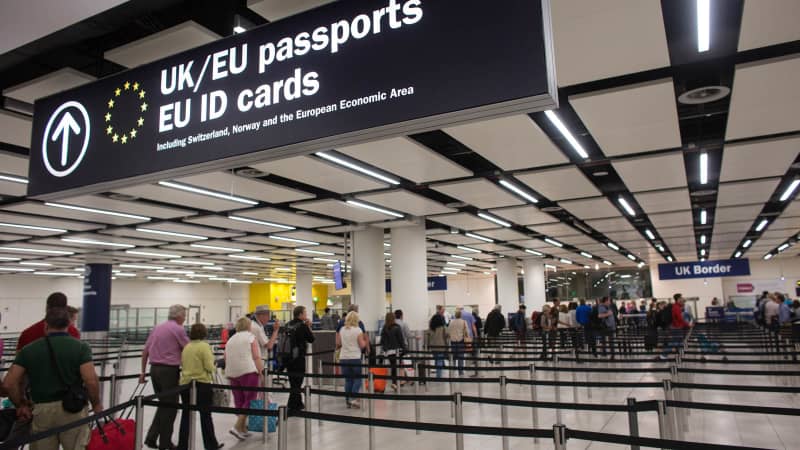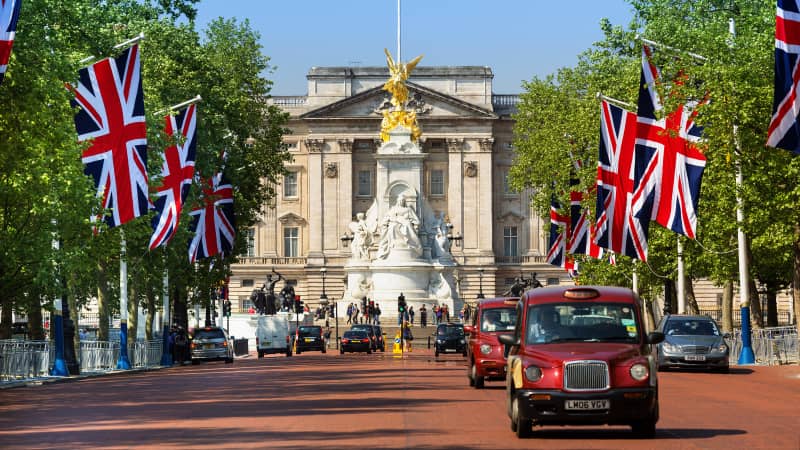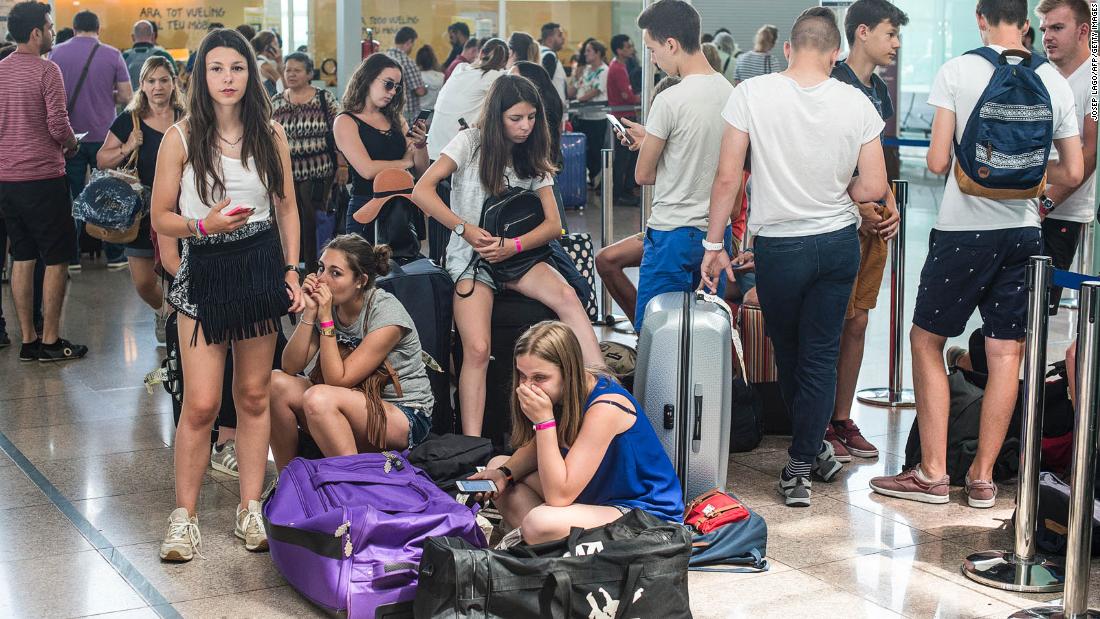(CNN) — Britain’s departure from the European Union is finally upon us, but after all the warnings of chaos for inbound tourists and problems for UK travelers heading to the continent, what will situations will travelers actually face after January 31?
The arrival of Brexit comes three and a half years after the country held a referendum that set it in motion and follows a series of missed deadlines, each one carrying the threat of the UK leaving with “no deal” — a scenario that raised the prospect of a shortage of medical supplies and food, as well as long border queues.
What will change?

Travel between the UK and the EU will stay the same during the 11-month transition period.
Tolga Akmen/AFP via Getty Images
Although the UK exits the EU on January 31, it will remain part of the single market and customs union under the terms of the implementation period or transition.
This lasts until December 31, 2020, when it’s hoped a new trade deal, security arrangements and immigration laws will be enacted.
Failure to reach an agreement could lead to “no deal” becoming a live prospect once more. For now, that remains an issue for another day.
“The transition period, which kicks off from February 1, will mean that travel between the UK and Europe will stay exactly the same until December 31, 2020. “According to the FCO (Foreign and Commonwealth Office), UK nationals can continue to travel to the EU exactly as they do now,” says Tom Jenkins, chief executive of the European Tourism Association.
“You won’t need a visa or six months left on your passport or evidence of a return ticket.”
Frank Marr, Travel and Tourism Chairman for the PRCA and MD of AM+A, a travel marketing company based in the UK, agrees.
“Based on current agreements we expect a large chunk of things to stay the same — access to EU countries should not change for visitors looking to stay in Europe for less than a month,” he says.
However, as the UK and EU cannot legally start negotiations over their future relationship until February, it’s unclear how travelers will be treated come 2021.
Priti Patel, the UK Home Secretary, has said that whatever happens, freedom of movement, and the ability to work in the UK without a visa for EU citizens, will end.
There are currently plans for the UK to be part of the new European Travel Information and Authorization System (ETIAS) from next year (although there remains a chance ETIAS may not be up and running by then).
Similar to the ESTA visa waiver used by UK tourists traveling to the United States, this will allow UK citizens to travel into the Schengen Area without a visa, as long as they pay €7.
The waiver will last three years and can be bought online. However, the UK’s participation in ETIAS is dependent on the UK Parliament ensuring EU citizens can travel on holiday without a visa to the UK using a similar, electronic system.
Jonathan Smith, from the Association of British Travel Agents (ABTA), says people were receptive to the idea when the travel association conducted research into what was known about ETIAS.
“The majority of people we spoke with were quite happy with it, as long as it wasn’t too expensive or wouldn’t take them too long to do,” says Smith.
One exception to ETIAS will be the Republic of Ireland. Since 1923, the Common Travel Area has meant people from the UK and Ireland have been able to travel between the two countries without a visa.
“Brexit doesn’t change the ease of getting to Ireland or the warmth of the welcome,” says Niall Gibbons, CEO of Tourism Ireland.
However, the very real chance of the UK and EU not reaching an agreement by the end of 2020 means that frictionless travel across the English Channel could be over for good in 11 months’ time.
“It could well be that we’re back communicating on the issues we were talking about at previous deadlines,” adds Smith.
“Such as the need for passports to have extra validity, what would happen with changes to driving rules and the validity of European Health Insurance Cards.”
What will airports and ferry terminals be like?

Travelers may have to use different queues when arriving at airports and ferry terminals.
Oli Scarff/Getty Images
“In the initial transition period visitors traveling in the UK and the southeast of England are unlikely to see much of a change, with flights continuing to run smoothly, European visitors continuing to travel on ID cards and e-passport gates still permitted for all international visitors,” explains Fran Downton, chief executive of Tourism South East, which promotes the English region that’s geographically closest to continental Europe.
However, even if an agreement on the future relationship is reached by the end of the year, there’s a chance travelers will have to use different lines on arrival at airports and ferry terminals, with additional checks in place.
This could cause major delays, especially at already clogged airports such as Heathrow, with major concerns about traffic at busy ports like Dover in the UK and Calais in France. Issues could arise around EU citizens traveling to the UK on ID cards rather than passports, something they can currently do but may be banned from doing next year.
“The difficulty lies in the fact that EU countries have a binding obligation to treat non-EU/EEA visitors differently,” adds the European Tourism Association’s Tom Jenkins.
“This could lead to delays at borders, as no country has yet built immigration capacity sufficient to cope with full scrutiny of big volumes of arrivals.”
Kelly Cooke, leisure director at Advantage Travel Partnership, the UK’s largest independent travel agent consortium, expresses similar concern.
“The government also needs to give clarity, as deals are finalized, that the process of entering the EU from the end of December 2020 will not lead to long queues on arrival as this will deter travelers.”
What about driving in the EU?

Travelers driving from the UK to the EU via the Channel Tunnel may need and International Driving Permit.
Rudy and Peter Skitterians from Pixabay
While taking a car from the UK to the EU via the Channel Tunnel or on a ferry service will remain as simple after January 31, it’s likely that by 2021, things will have changed.
Drivers may also need a special “green card” from their insurance company and a GB sticker on their bumper.
This issue may be resolved during the upcoming negotiation, with an easier, EU-wide set of rules for UK drivers potentially being put in place.
Will you need travel insurance?

Holidaying in the EU could become more costly for those with long-term illnesses.
Savo Prelevic/AFP/Getty Images
The European Health Insurance Card (EHIC), which guarantees carriers access to free medical care, will still be valid during the transition. As with so much else surrounding Brexit, the real conundrum comes in 2021.
According to official UK guidance: “After Brexit your European Health Insurance Card (EHIC) card may not be valid.”
It’s doubtful the UK will remain part of the EHIC system, meaning UK travelers will need a comprehensive insurance policy to ensure they get healthcare in case of an emergency.
As EHIC covers pre-existing conditions, this could make holidaying in the EU more costly for those with long-term illnesses. ABTA, however, says its guidance remains the same as ever.
“ABTA has always advised holidaymakers and business travelers to make sure they have appropriate travel insurance, whether they have an EHIC card or not, as there are limitations to EHIC,” it says on its website.
Will mobile phone bills soar?

Mobile phone roaming charges are likely to soar for UK travelers to Europe.
Sean Gallup/Getty Images
Agreements, which came into force in 2017, outlawed punitive roaming charges for European citizens when using their mobile phone within the European Union.
However, while these are set to stay in place during the implementation period, the lack of clarity over the UK’s future relationship means they could be back for British travelers in 2021.
“Mobile roaming charges are likely to re-appear in Europe, so we’d advise travelers to check carefully with their providers, to avoid the potential for large unexpected bills,” says James Lynn from Currensea, a travel payment card provider.
While no network in the UK has said it will reintroduce roaming charges, a lack of EU regulation from 2021 means that divergence could lead to higher prices for travelers.
“After Brexit, the guarantee of free mobile phone roaming throughout the EU, Iceland, Liechtenstein and Norway will end,” says the official UK government website.
A cheap bet for US travelers?

The weakening of the pound against the dollar will benefit US visitors to the UK.
Shutterstock
Since the Brexit vote, the value of the pound has plunged considerably against both the euro and US dollar.
UK Prime Minister Boris Johnson’s re-election in December 2019, and the prospect of stable government, saw a brief rebound, but as 2020 wears on and uncertainty over an agreement grows, that weakness is likely to remain a theme.
“In the short term, we expect to see a continued recovery of the pound, but predict continued exchange rate volatility until the final withdrawal agreement is in place,” adds Lynn.
“Going into 2021, we see far greater uncertainty about the pound at this stage.
“A compromised withdrawal deal could lead to a far weaker pound, leading to a strong focus on cheaper destinations for holidaymakers as a result.”
However, a weak pound does mean that inbound tourism to the UK from outside the EU could be boosted.
It seems that while Brexit will have a very real effect on travel from the UK, the weakening of sterling has had a positive on the at home tourism industry.
“The US remains the top-ranking country for inbound visitors to the UK and southeast in terms of visits and spend, although it’s hard to predict the long-term strength of the pound,” says Downton.
“It is unlikely that it will impact the position of US inbound visitors.”
However, for UK travelers, higher prices for EU trips, especially after the transition period ends, are a growing concern.
“The need for clarification on cross border movement will become a priority when companies launch their holidays for 2021,” explains Cooke.
“Currently we know that there will be changes, but not what they will look like and this could impact pricing.”
